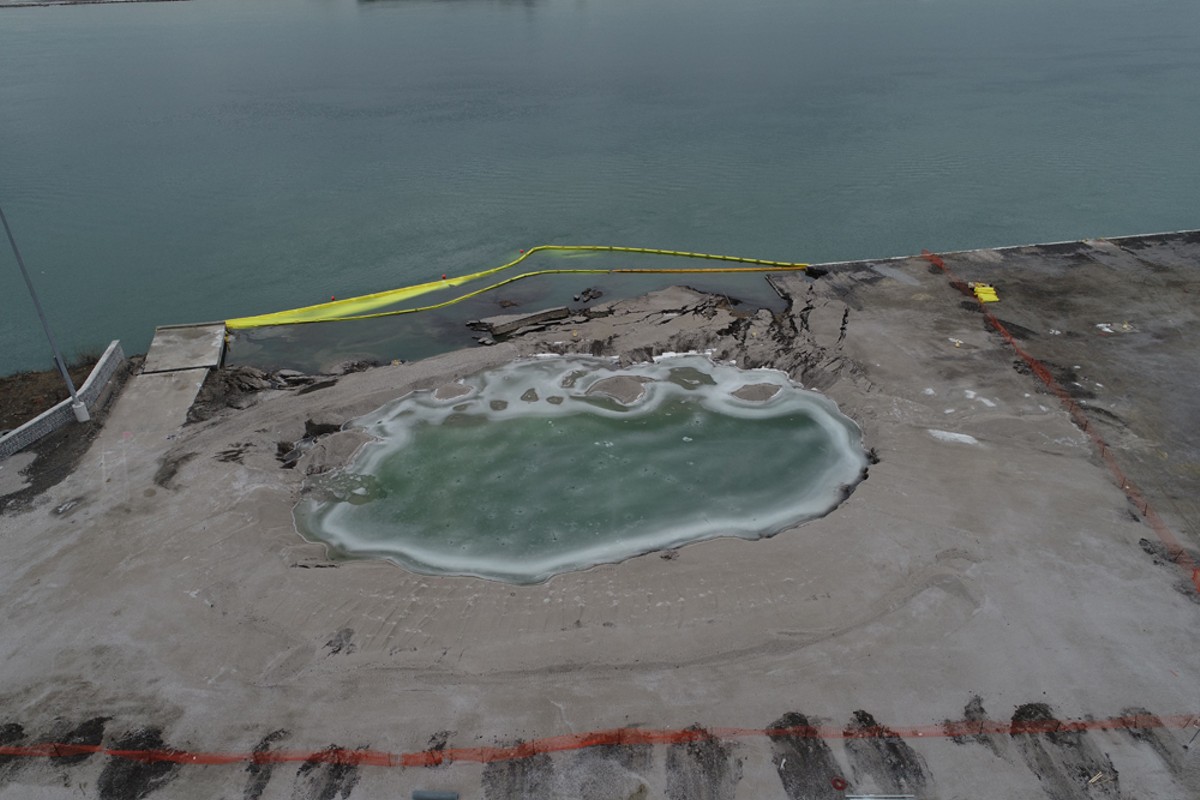The companies responsible for a collapsed dock that spilled contaminated soil into the Detroit River in November have operated outside of the law, and no government agencies appeared to be aware of it until it was too late.
Even now, more than two months after Detroit Bulk Storage caused the collapse by illegally storing an overabundance of limestone gravel along the river, the site continues to erode — with a widening sinkhole — because the companies have been slow to act. On Friday, the state Department of Environment, Great Lakes, and Energy (EGLE) warned that contaminated material could continue to erode and fall into the river until more aggressive action is taken by the companies.
To avoid a similar occurrence, environmentalists and residents are calling on local, state, and federal governments to establish stronger laws and play a more active role in monitoring toxic sites along waterways.
For more than four months, the city was unaware that large mounds of gravel were piling up on toxic land that was used in the 1940s for manufacturing uranium-based products and later became a dumping ground for other toxins.
Detroit Bulk Storage, which began renting the toxic riverfront property from Revere Dock in May, was prohibited from using the site to stockpile gravel because it lacked a city permit. According to the city, the property, which is about a mile south of the Ambassador Bridge, was supposed to be "vacant commercial land."
Despite the dangers lurking in the soil, the city isn't even sure when it last inspected the site. It had been "at least a year or two," David Bell, director of the city's Buildings, Safety Engineering & Environmental Department (BSEED) tells Metro Times, saying "the computer system BSEED has used until recently does not reflect the last time an annual property maintenance inspection was conducted."
Environmental activists say the city needs to regularly inspect sites along waterways and be more aware of the dangers of toxic properties.
"We've been trying to push the mayor's office and the council to take the issue more seriously," Justin Onwenu, a community organizer for the Sierra Club, tells Metro Times. "The city needs to do a better job."
Since the Nov. 26 collapse, Onwenu and other activists have been urging the city to adopt a more stringent ordinance to protect residents' health and the waterway. On Jan. 14, they met with the mayor and his administration with a proposal to require, among other things, inspections of shoreline properties, a publicly accessible website that identifies heavily contaminated parcels, and an emergency preparedness plan in the event of a repeat occurrence.
By most accounts, city officials have been responsive. The city is pledging to conduct annual inspections of waterfront properties, require an independent engineering report of seawalls, and create a list of heavily contaminated parcels on the city's website.
"Going forward, each of these riverfront properties will be inspected annually," Bell tells Metro Times.
Since the collapse, city inspectors have reviewed all 152 properties along the riverfront and discovered that five had been operating with unsafe conditions, Bell says.
"BSEED has been issuing tickets daily to the property owners and the tenants until these issues are resolved," Bell says.
The inspections resulted in 401 tickets totaling $162,895.
BSEED also ordered the property owners to submit an independent engineering report.
The city also filed a lawsuit last week against Revere Dock and Detroit Bulk Storage, alleging the property remains unsafe and blighted and is a "public nuisance and danger to the safety and welfare of the public." The suit also says the companies have not adequately addressed the collapse, warning "it may collapse and further contaminate the natural waterway."
In the suit, the city also said Revere Dock has $1,769 in outstanding property taxes and $37,350 in unpaid drainage fees, according to the suit.
On Friday, the state also raised concerns about Revere Dock's efforts to prevent contaminated soil from eroding into the river. The 20-foot silt curtain that crews are using to prevent more contaminated soil from entering the river "is not performing satisfactorily," EGLE spokesman Nick Assendelft said in a news release. He added that the sinkhole "was not evaluated adequately and may be allowing additional materials from the property, including aggregate and contaminated soils, to enter the river."
PM Environmental Inc., the company contracted by Revere Dock, recently submitted an 82-page interim response plan that lays out further testing, cleanup, and restoration of the river bank. EGLE rejected the company's first interim response plan, saying it was "inadequate."
The state imposed a Feb. 29 deadline to submit a progress report and geotechnical investigation results, and a March 30 deadline to submit a restoration plan report, which outlines the longer-term remediation strategies.
Environmental activists and residents are unhappy with the pace of the cleanup and are calling on the state to act with more urgency.
"They should be working to push cleanup to happen in a more reasonable time frame," Onwenu tells Metro Times. "At the very least, the site needs to be secured with the proper silt curtain and other damming technology that would prevent this contamination from leaching into the Detroit River."
Onwenu pointed to the state's relatively quick response to the bright green liquid that was oozing onto I-696 and questioned why the state wasn't acting with the same urgency.
On the state and federal level, lawmakers are calling for more stringent laws to prevent another potential disaster.
State Sen. Stephanie Chang, of Detroit, is helping draft legislation that would require regular inspections of docks, speedy notifications to EGLE during a spill, risk assessments, and a public database with information about waterway properties.
"There is going to be significant change," Chang tells Metro Times. "It's really important because the public should know what is along our waterways, especially with climate change and rising water. It's something we need to pay close attention to."
On the U.S. House floor, Rep. Brenda Lawrence, whose district includes the collapse site, expressed concern about the lack of urgency by the companies and public officials.
"This situation demands a sense of urgency to restore the public faith in our government to protect them from contaminated water," Lawrence said. "If there is a threat to our public health, our government has a responsibility to protect our constituents from harm."
U.S. Rep. Rashida Tlaib, of Detroit, has demanded more oversight and urgency and warned the state not to trust the companies to do the right thing. Tlaib has met with local and state officials to support the stronger environmental protections that are promoted by environmental activists.
"Throughout this saga, we have used our power to convene and power of the letterhead to gather information and put pressure on federal agencies to take swift action and communicate with the public," Tlaib tells Metro Times.
EGLE says it has taken the matter seriously, has performed extensive testing, and is closely monitoring progress on the site.
"EGLE will continue working with all participating local, state, and federal agencies to ensure that steps are being taken by the companies to meet their regulatory obligations," Assendelft tells Metro Times.
Testing of water samples at the site has uncovered uranium, lead, and other chemicals and heavy metals, but not at levels that exceed federal standards.
The Nov. 26 collapse didn't come to light until the Windsor Star published a story about it on Dec. 5. Prior to that, no one bothered to inform environmental agencies.
On the city and state level, public officials are working to establish notification requirements.
"Many of us learned about the collapse from a Canadian newspaper," Lawrence said on the House floor.
The city sold the contaminated site to Revere Dock for $2.3 million in October 2015.
Stay on top of Detroit news and views. Sign up for our weekly issue newsletter delivered each Wednesday.







